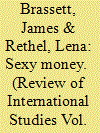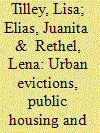| Srl | Item |
| 1 |
ID:
121580


|
|
|
|
|
| Publication |
2013.
|
| Summary/Abstract |
In the wake of the financial crises of the last two decades, the promotion of corporate governance reform has emerged as a priority concern of the international financial community. This paper draws attention to the role played by Sovereign Wealth Funds (SWFs) in this process. It shows that SWFs' enactment of a common set of shareholder-oriented corporate governance reforms has not solely been driven from the 'outside in'-i.e. conforming to prevailing global financial norms and pressures. Indeed, various SWFs are in fact attempting to change financial best practice from the 'inside out' by promoting a transformative shareholder-value model of corporate governance throughout the companies they hold in their investment portfolios. To better elucidate the dynamics of this process, this paper looks at the experience of two SWFs in Asia and Europe. More specifically, it will explore the corporate governance agendas of Norway's Government Pension Fund-Global and Malaysia's Khazanah Nasional Berhad.
|
|
|
|
|
|
|
|
|
|
|
|
|
|
|
|
| 2 |
ID:
164710


|
|
|
|
|
| Summary/Abstract |
The production and contestation of exemplary centres in Southeast Asia
|
|
|
|
|
|
|
|
|
|
|
|
|
|
|
|
| 3 |
ID:
139585


|
|
|
|
|
| Summary/Abstract |
The article develops a critical analysis of gendered narratives of global finance. The post-subprime crisis equation of unfettered global finance with the excessive masculinity of individual bankers is read in line with a wider gender narrative. We discuss how hetero-normative relations between men and women underpin financial representations through three historical examples: war bond advertising, Hollywood films about bankers, and contemporary aesthetic representations of female politicians who advocate for austerity. A politics emerges whereby gender is used to encompass a/the spectrum between embedded and disembedded finance, approximate to the divide between oikonomia and chrematistics. The apparently desirable ‘marriage’ between the state and finance that ensues carries several ambiguities – precisely along gender lines – that point to a pervasive limit: the myth of embedded liberalism in the imagination of global finance.
|
|
|
|
|
|
|
|
|
|
|
|
|
|
|
|
| 4 |
ID:
164716


|
|
|
|
|
| Summary/Abstract |
The dispossession of urban communities across class and racial lines is a global phenomenon linked to the expansion of international investment in the development of ‘exemplary’ city space. However, city evictions are also historically informed and gendered processes which are continuous with past colonial and postcolonial urban rationalisation projects. Drawing on testimonies of women evictees in Jakarta, as well as interviews with public housing managers, this article details the gendered nature of the rationalisation of urban life in the context of a contemporary evictions regime. We argue that the rationalisation of urban space serves to sharpen the gender order by placing material constraints on women's roles, limiting their economic activities and defining them as hygiene‐responsible housewives. Further, and in turn, the limited provision of ‘rusunawa’ public housing, which we show to be a gendered spatial and social transition informed by state doctrine on the family, provides the state with justification for dispossession itself. Finally, women's everyday acts of refusal and resistance show not only that kampung forms of social life continue to be preserved in Jakarta, but also that rationalisation itself is a negotiated and contingent process.
|
|
|
|
|
|
|
|
|
|
|
|
|
|
|
|